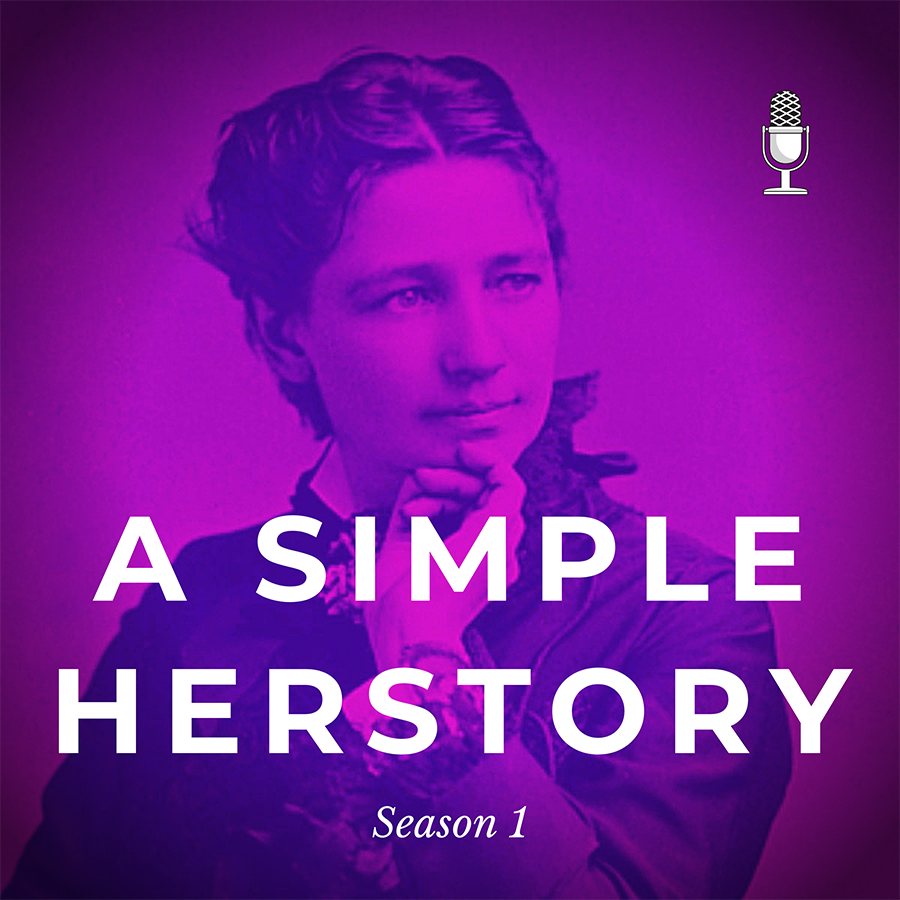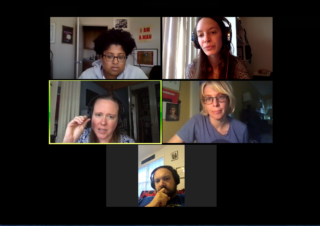Learning How to Listen Again with Audio Fiction
By Kirsten Nelson

No one wants to sound old-fashioned, ever. But nostalgia is okay, so let’s go with that. Picture a cozy scene with a small group of people gathered around a radio. They’re listening intently to a show that has transported them to another place and time, solely through the magic of clever voice actors and plenty of sound effects. The experience is immersive in the pure way it was before immersive was cool. And it’s magic.
That sounds like an ancient memory, but actually, radio drama lives on today. Within the rapidly expanding worlds of podcasts and audiobooks there is a new (or is it old?) form of entertainment gaining a lot of attention.
Distribution hubs like Audible and Spotify are brokering deals for audio-only productions that go beyond the usual podcasts and audiobooks. Now there are more scripted podcasts joining the interviews and random chats that litter the landscape. And audiobooks are expanding from a single narrator to multi-member casts putting on a show. Further, there are more and more audio-only books out there, stories that never see a print version.
In the festival world, the Tribeca Film Festival launched its audio storytelling selection in 2020. The Peabody Awards presented its first ever honor for a scripted podcast (or more specifically, fiction podcast) series, The Unexplainable Disappearance of Mars Patel, in 2016. Sundance and SXSW have partnered with Audible on listening rooms and speaking programs exploring the potential of this dynamic way to catch the ear of audiences.
People are loving the listening thing. There are endless options for stories, topics and voices out there. It’s actually kind of chaotic, truth be told. It can be hard to find what you love without feeling like you’re engaged in yet another endless content scroll. And some might say that now that big Entertainment has discovered these outputs, their mega budgets are driving all the attention to mega celebrity shows.
For those passionate about the art form of audio fiction though, these elements are an alchemist’s dream. Finally there are budgets and growing interest in a medium that has been waiting in the wings since those golden times of radio networks and their associated rosters of familiar voice actors who could play a multitude of characters in one night, without any costume or makeup changes, set redressing or fussing over the lighting.
Audio fiction is meeting three great moments at once: technology easily supports an ensemble recording in person or remotely; audiences are craving screen-free entertainment that transports them out of whatever reality they happen to be in; and major content creators, distributors and arbiters are ready to boost this segment.
In fact, several major players from the audio fiction world just launched a new salon devoted to the art form at one of New York City’s most historic arts institutions, The Salmagundi Club. The “Breaking The Audio Fiction Form” series is creating community among writers, producers, performers and recording engineers, with an aim toward fostering even more growth in this open and welcoming art form.
“Breaking the Audio Fiction Form” emerged from conversations between Jocelyn Kuritsky, an actor and creator of the Telly-Award-winning A Simple Herstory; Jenny Turner Hall, creator and director of the Peabody-winning Mars Patel, and writer/director of one of the top audio fiction podcasts worldwide, Marvel’s Wastelanders: Wolverine, and director of an Audible 2023 “Best of the Year” audio fiction series, I Think You’re Projecting; and James Scully, creator of the Tribeca Audio 2022 selection, Burning Gotham.

For their first event in January 2024, these three salon founders were joined by Tribeca Audio head Davy Gardner and Arielle Nissenblatt, EarBuds Podcast Collective founder and host of Trailer Park, the podcast trailer podcast. I am familiar with all of this because I had the honor of moderating their panel discussion that first night.
Before we did the panel, I spoke with Kuritsky and Scully about what it will take to “break” the audio fiction form. A combination of curation, organization, marketing and of course content creation will all drive this subset of podcasting to new heights.

(clockwise, l-r) – Donya K. Washington, Jocelyn Kuritsky, Jenny Turner Hall, Jonathan A. Goldberg, Jane Shaw.
Before any of those logistical or promotional elements can really take hold, we do need to go back in time a little bit and remind people how to best enjoy entertainment that is actually only about using one sense in a multi-sensory world.
“If we can teach people how to listen, and to have patience with their own absorption process, it can be really satisfying because it becomes very personal,” Kuritsky described. “There’s a way in which you can absorb information and entertainment that is very rich — some of this audio fiction stuff is very rich, like a chocolate cake with many layers. So if we can persuade people to listen to audio fiction like it’s avant garde theater, in the sense that some of this will wash over you, and you can go back if you want, or just take what you like, then you develop an attachment to how you interpreted the information.”
Once audiences start listening, they might easily become overwhelmed with the vast sea of audio fiction options. This is where marketing, curation, and yes, criticism come in. Coming from the theater world, Kuritsky admits that she actually loves critics. They’re necessary for helping audiences interpret and discover what they might like. “There’s a total dearth of criticism, so there’s no critical body evaluating this work,” she observes, “There’s a vocabulary that doesn’t quite exist yet, which is a problem.”
But anyone in business knows that where a problem exists, an opportunity is soon to follow. As audio fiction attracts more attention, and more festivals and awards are given, it will be like any form of entertainment — there will be an audience who loves each very specific type of show.
Additionally, the podcast production companies might also provide a boost akin to the way radio broadcasting networks became known for certain actors and programs. Looking at that historical model provides some insights — and luckily, Scully happens to be a radio historian in addition to an audio fiction writer, actor, producer and creator.
“What we should be trying to do with fiction podcasting is develop something akin to the old model of the movie studio,” Scully suggests. “The old contract structure where there was an in-house cast and a team that could greenlight shows.” Having a roster of talent that is continually developing shows and creating work together would lead to a depth of audio fiction programming within the seemingly infinite breadth of podcasting.
Kuritsky elaborates on this idea: “If the podcasting world was more organized, listenership for audio fiction would go up because people would know what they were looking for. There’s so much creativity out there. And it’s not just nonfiction and fiction, there are all kinds of mixes and matches within that. The levels of production vary enormously as well, and there’s nothing wrong with that. There’s an audience for all of these different genres and groups. But if people don’t know where to look or what they’re looking for, it’s very difficult to wrangle audience. It’s just overwhelming.”
Where there’s audience there will be advertising potential, and where that exists, there will be new budgets. More mega studios are waking up to the potential in audio storytelling, and budgets will shift accordingly. Fortunately or not, audio productions are definitely more economical than movies and television. “It’s a cheap media to produce, but it’s being treated too cheaply,” Scully notes. “It needs to be considered a little bit more than what it is in order for it to grow.”
After all, audio as an art form is less about superficial appearances and more about getting to the heart of a story using just one of our senses. This is a welcome prospect in this age.
“Podcasting is very popular partly because it’s focused in a way — it’s not preying on all your senses,” Kuritsky observes. “And I think people are hungry for something focused and grounded in a way. The overall structure of podcasting may be disorganized at the moment, but podcasts themselves usually consist of just one or a few voices (or, in the case of A Simple Herstory, 23 voices within the same sonic world). And when we get specifically into audio fiction, they’re actually very concentrated and down to earth. They get you out of the sphere of crazy. I think that’s why people listen to them all the time, they’re grounding.”
Stay up to date with the Dante Journal
* indicates required fields




